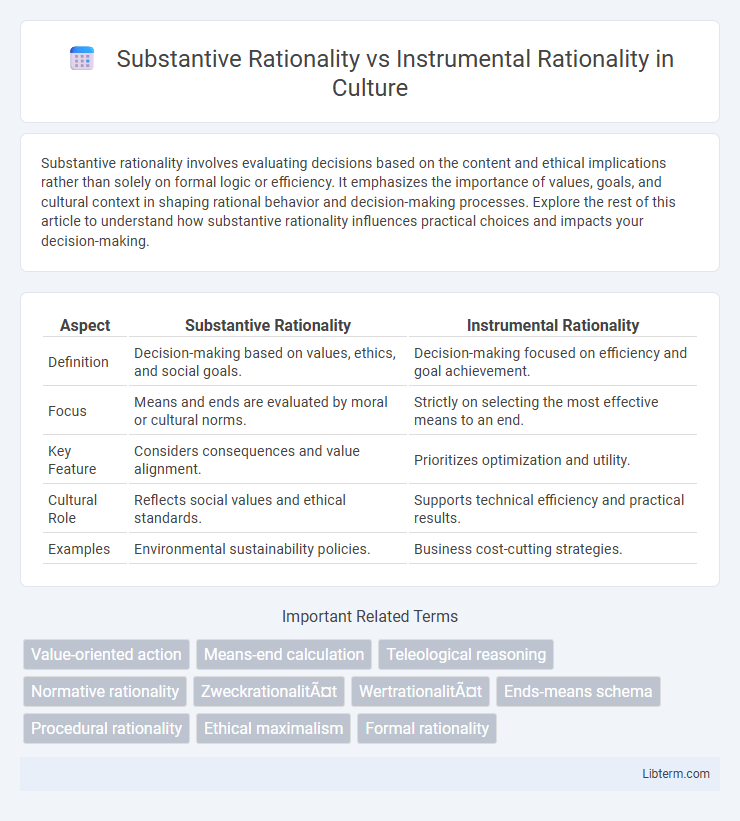Substantive rationality involves evaluating decisions based on the content and ethical implications rather than solely on formal logic or efficiency. It emphasizes the importance of values, goals, and cultural context in shaping rational behavior and decision-making processes. Explore the rest of this article to understand how substantive rationality influences practical choices and impacts your decision-making.
Table of Comparison
| Aspect | Substantive Rationality | Instrumental Rationality |
|---|---|---|
| Definition | Decision-making based on values, ethics, and social goals. | Decision-making focused on efficiency and goal achievement. |
| Focus | Means and ends are evaluated by moral or cultural norms. | Strictly on selecting the most effective means to an end. |
| Key Feature | Considers consequences and value alignment. | Prioritizes optimization and utility. |
| Cultural Role | Reflects social values and ethical standards. | Supports technical efficiency and practical results. |
| Examples | Environmental sustainability policies. | Business cost-cutting strategies. |
Introduction to Rationality in Philosophy
Substantive rationality in philosophy emphasizes the importance of values and ethical considerations in reasoning, ensuring that the ends pursued are morally or socially justified. Instrumental rationality, in contrast, is concerned with the most efficient means to achieve given goals, regardless of the nature or morality of those goals. Understanding these distinctions is crucial in philosophy as they highlight different approaches to decision-making and human behavior analysis.
Defining Substantive Rationality
Substantive rationality refers to decision-making based on value-oriented goals, emphasizing the ethical, cultural, or societal consequences of actions rather than mere efficiency. It evaluates choices through the lens of broader social norms and intrinsic purposes, contrasting with instrumental rationality, which prioritizes methods to achieve specific ends. This form of rationality integrates moral considerations and long-term impacts within the analytical framework.
Understanding Instrumental Rationality
Instrumental rationality involves selecting actions based on their efficiency in achieving specific goals, prioritizing means-end calculation without evaluating the intrinsic value of the ends themselves. It emphasizes optimization of resources and strategies to maximize utility or desired outcomes, often applied in economics, decision theory, and organizational behavior. Understanding instrumental rationality requires analyzing how individuals or institutions choose tools or procedures that best fulfill predefined objectives under given constraints.
Core Differences Between Substantive and Instrumental Rationality
Substantive rationality evaluates actions based on adherence to ethical values, norms, and long-term goals, emphasizing the quality and justification of ends. Instrumental rationality focuses on selecting the most efficient means to achieve predetermined objectives, prioritizing effectiveness and cost-benefit analysis. The core difference lies in substantive rationality's concern with the validity of goals themselves, while instrumental rationality is concerned solely with the optimal means to achieve given goals.
Historical Perspectives on Rationality Theories
Historical perspectives on rationality theories highlight Substantive Rationality as emphasizing value-oriented decision-making grounded in ethical or cultural norms, contrasting with Instrumental Rationality's focus on efficiency and goal achievement through calculated means. Max Weber's seminal work distinguished these forms by linking substantive rationality to meaning and ethical considerations, while instrumental rationality aligns with economic and bureaucratic logic. These distinctions have shaped sociological and philosophical debates, influencing how rational behavior is interpreted across historical and social contexts.
Applications in Ethics and Decision-Making
Substantive rationality evaluates decisions based on adherence to ethical principles and values, ensuring that actions align with moral norms and societal goals. Instrumental rationality prioritizes efficiency and goal achievement, optimizing means to reach desired outcomes regardless of underlying ethical considerations. In decision-making, combining substantive rationality with instrumental rationality promotes ethically responsible strategies that are both effective and morally sound in fields such as business ethics, public policy, and organizational leadership.
Rationality in Economics and Social Sciences
Substantive rationality in economics and social sciences evaluates decisions based on value-oriented outcomes aligned with ethical or societal goals, emphasizing the legitimacy of ends pursued. Instrumental rationality focuses on the efficiency of means employed to achieve specific objectives, prioritizing cost-benefit analysis and resource optimization regardless of broader social implications. Understanding the distinction is crucial for analyzing behavior in markets, policy-making, and institutional frameworks where both goal orientation and procedural efficiency intersect.
Critiques and Limitations of Each Approach
Substantive rationality faces criticism for its potential subjectivity and cultural bias, as it evaluates decisions based on values or goals that may not be universally accepted or measurable. Instrumental rationality is often limited by its narrow focus on efficiency and means-end calculations, potentially ignoring ethical considerations and long-term consequences. Both approaches struggle with complexities in human behavior and the unpredictability of real-world contexts, challenging their effectiveness as sole frameworks for decision-making analysis.
Real-world Examples Illustrating Both Rationalities
Substantive rationality is evident in environmental policy-making where decisions aim to achieve ethical and sustainable outcomes, such as the implementation of carbon emission regulations prioritizing long-term ecological health over short-term economic gains. Instrumental rationality is illustrated by a corporation optimizing production processes solely to maximize profit, regardless of social or environmental consequences. Both rationalities guide real-world decisions, highlighting value-oriented reasoning versus efficiency-focused calculation.
Conclusion: Implications for Modern Thought
Substantive rationality emphasizes values and ethical considerations guiding decision-making, while instrumental rationality focuses on efficiency and goal attainment through means-ends calculation. The tension between these rationalities challenges modern thought to balance moral imperatives with pragmatic problem-solving in social, economic, and political contexts. Integrating both concepts fosters a more holistic approach to rationality, addressing complex contemporary issues through ethical frameworks without sacrificing practical effectiveness.
Substantive Rationality Infographic

 libterm.com
libterm.com